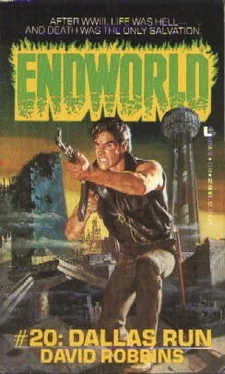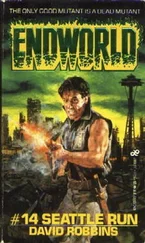David Robbins - Dallas Run
Здесь есть возможность читать онлайн «David Robbins - Dallas Run» весь текст электронной книги совершенно бесплатно (целиком полную версию без сокращений). В некоторых случаях можно слушать аудио, скачать через торрент в формате fb2 и присутствует краткое содержание. Город: New York, Год выпуска: 1990, ISBN: 1990, Издательство: Leisure Books, Жанр: sf_postapocalyptic, Боевая фантастика, на английском языке. Описание произведения, (предисловие) а так же отзывы посетителей доступны на портале библиотеки ЛибКат.
- Название:Dallas Run
- Автор:
- Издательство:Leisure Books
- Жанр:
- Год:1990
- Город:New York
- ISBN:978-0843929386
- Рейтинг книги:4 / 5. Голосов: 1
-
Избранное:Добавить в избранное
- Отзывы:
-
Ваша оценка:
- 80
- 1
- 2
- 3
- 4
- 5
Dallas Run: краткое содержание, описание и аннотация
Предлагаем к чтению аннотацию, описание, краткое содержание или предисловие (зависит от того, что написал сам автор книги «Dallas Run»). Если вы не нашли необходимую информацию о книге — напишите в комментариях, мы постараемся отыскать её.
Dallas Run — читать онлайн бесплатно полную книгу (весь текст) целиком
Ниже представлен текст книги, разбитый по страницам. Система сохранения места последней прочитанной страницы, позволяет с удобством читать онлайн бесплатно книгу «Dallas Run», без необходимости каждый раз заново искать на чём Вы остановились. Поставьте закладку, и сможете в любой момент перейти на страницу, на которой закончили чтение.
Интервал:
Закладка:
“Whatever you say, Plato,” President Toland responded. “Lead the way.”
Plato nodded and led off through the crowd toward the drawbridge, and the rest fell in to his rear, except for Blade. The giant strolled on Plato’s right, and Plato became aware that the Warrior was studying him intently. “Do I have food crumbs in my beard?”
“No,” Blade said, and chuckled. “Nadine told me yesterday that you haven’t been feeling too well lately.”
“That wife of mine is worse than a mother hen,” Plato groused. “A simple touch of the flu has escalated into a case of the bubonic plague. I’m physically fit, thank you. The Healers administered an herbal remedy that was remarkably efficacious.”
President Toland, who was following directly behind Plato, overheard their banter. “Can these Healers of yours cure many diseases?”
“They are extremely skilled at treating all manner of ailments,” Plato answered in his soft voice. “They adhere to the naturopathic method of treating illness as opposed to the allopathic, the homeopathic, or any of the other methods commonly employed before World War Three.”
“I’m not a doctor. What’s the difference?” President Toland inquired.
“There are major differences between the various methods,” Plato elaborated. “The Healers could explain them much better than I can, although there is an example that might be instructive. Prior to the war, the physicians in many countries treated disease by injecting vaccines consisting of dead bacteria or virus particles into the patient in the hopes of inducing the patient’s body to produce antibodies to fight the disease. Naturopathy, by contrast, uses herbs and food and heat and exercise to promote healing.”
“And this naturopathic business works?” President Toland inquired, his tone tinged with skepticism.
Plato glanced over his right shoulder and smiled. “We’ve survived for over a century.”
They crossed over the moat and angled in the direction of E Block.
President Toland inhaled deeply, then sighed. “You know, Plato, I envy you.”
“Why?”
“For one thing, you’re not cooped up in an office all day. Look at this compound. Fresh air. Sunshine. Kids playing. Birds singing. The whole atmosphere of the Home is restful and pleasant,” Toland said. “But I spend an average day in my office, and all I have to stare at are four walls.
From six in the morning until midnight, six days a week, I’m usually behind my desk. I read reports and sign documents and meet with government officials and other visitors to the capital in Denver. Venturing outdoors is a luxury I can rarely indulge. In my capacity as Chief Executive I attend scores of functions each month, and even then I seldom have an opportunity to really relax.”
“Relaxation is essential to a fuller enjoyment of life. Periods of work must be alternated with periods of play,” Plato advised.
“I know that,” President Toland replied. “But the degree of our responsibilities is vastly different. You’re the leader of approximately one hundred people and you oversee a thirty-acre compound. I’m the leader of a few million people, and there are about six hundred and fifty thousand square miles in the Civilized Zone. If our situations were reversed, I doubt you’d find much time to smell the roses either.”
“I’d make time.”
“Easier said than done,” President Toland said. “I’m just glad I don’t have a wife and children. I’d never get to see them.” He paused. “But I guess a person has to make sacrifices in the name of service and duty.”
“Sacrifice is one thing, martyrdom is another,” Plato said. “When you deny yourself a family, when you forsake knowing the joy of binding with a woman and rearing children, you deprive yourself of an essential human experience. Devotion to duty is commendable, but not at the expense of your spiritual welfare.”
President Toland listened attentively, and he wasn’t the only one. Blade stared at his mentor, engrossed.
“The Elders have conducted an extensive study of prewar society,” Plato mentioned in his pedantic style. “We know, for instance, that America was in a state of decline during the decades before the war. The major cities were war zones where drug addiction was epidemic and the police and the military battled gangs of violent youths. Illiteracy was widespread. Instead of teaching ennobling ideals and moral values, the schools taught an insidious humanist doctrine that advocated self-gratification and selfishness. Degeneracy flourished. Euthanasia was encouraged. Teenagers and college students committed suicide at a staggering rate, and the elderly were subjected to a public propaganda campaign designed to entice them to terminate their own lives so they wouldn’t be a burden on the social structure. Most of the politicians, instead of having the interests of the people at heart, were power-mongers who loved money more than they did the idea of serving their fellow man.”
“Are you implying I’m a power-monger?” President Toland asked.
“Not at all,” Plato said. “You sincerely want to improve the conditions under which the citizens of the Civilized Zone live, and you won’t allow vested interests to manipulate the people against their will.” He looked at Toland and smiled. “At least, I hope you won’t.”
“What does all of this have to do with my not getting married?” Toland inquired.
“Our study of the prewar culture revealed an alarming fact,” Plato disclosed. “The populace back then, particularly those in the industrialized nations, had allowed themselves to be swept up in the materialistic mania perpetuated by the money barons. In America, as an example, in order for a typical family to pay their monthly bills it was necessary for both the father and mother to work, leaving their children to be reared by strangers at establishments called daycare centers. Without the loving, nurturing guidance of their parents, the children were left adrift in a morass of immorality where the young ones were preyed upon by deviates and drug czars.”
“I repeat,” President Toland interrupted. “What does all of this have to do with me?”
“Simply this. Nearly everyone in America was infected by the status delirium. The quest for success dominated their lives. The almighty dollar became their god. Their marriages suffered. Their children suffered.
Ultimately, the humanist doctrine of self-gratification destroyed the bedrock of their civilization, the foundation of all culture, the institution of the family and the home. Without the home, any civilization is doomed,” Plato said, staring ahead at E Block. “Those prewar Americans and you have a lot in common, President Toland. Like them, you’re stuck in a rut of your own making. You work yourself to death, and for what? I’m not belittling your devotion to duty, but I strongly suggest you have misplaced your priorities. Will the Civilized Zone government collapse if you take several days off? I doubt it. Will you be happier thirty years from now looking back on the memories of your civil service, or would you be happier remembering thirty years of sharing your life with the woman you love? You’re snared in a frantic rat race, and the only one who can free you is you .”
They covered several yards before President Toland spoke. “I never really thought of it that way. Your reputation for wisdom and compassion is well founded.”
Blade merely gazed absently at the grass, contemplating the pertinence of Plato’s remarks to his own life. Toland wasn’t the only one stuck in a rut. Six months ago he’d reached the same conclusion, and he was no closer to resolving the dilemma. Some problems, evidently, were universal and decidedly difficult to overcome. He glanced at Plato and smiled. Ever since his father, the previous Family Leader, had been killed by a mutation, Blade had looked up to Plato for seasoned counsel. The sage had become a substitute father, in a sense, and the two had developed a deep bond of affection and friendship.
Читать дальшеИнтервал:
Закладка:
Похожие книги на «Dallas Run»
Представляем Вашему вниманию похожие книги на «Dallas Run» списком для выбора. Мы отобрали схожую по названию и смыслу литературу в надежде предоставить читателям больше вариантов отыскать новые, интересные, ещё непрочитанные произведения.
Обсуждение, отзывы о книге «Dallas Run» и просто собственные мнения читателей. Оставьте ваши комментарии, напишите, что Вы думаете о произведении, его смысле или главных героях. Укажите что конкретно понравилось, а что нет, и почему Вы так считаете.












